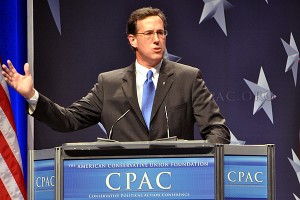National
GOP presidential hopefuls sign anti-gay marriage pledge
Romney, Bachmann, Santorum pen their names to document


Mitt Romney was among the GOP candidates who signed the marriage pledge (Blade file photo by MIchael Key)
A trio of Republican presidential candidates have signed a pledge promising to oppose same-sex marriage if elected to the White House and to establish a presidential commission to “investigate harassment of traditional marriage supporters.”
The three GOP candidates — former Massachusetts Gov. Mitt Romney, U.S. Rep. Michele Bachmann (R-Minn.) and former U.S. senator from Pennsylvania Rick Santorum — each penned their names to the pledge, which was written by the anti-gay National Organization for Marriage.
Brian Brown, president of the National Organization for Marriage, praised the three Republican presidential candidates in a statement for signing the pledge.
“Many candidates say they support traditional marriage (like President Obama!) but three GOP presidential candidates today stand head and shoulders above the crowd as marriage champions, for their willingness to go beyond words to commit to concrete actions,” Brown said. “We are grateful to Michelle Bachmann, Mitt Romney and Rick Santorum for their courage and their leadership in standing up for marriage, and so are millions of Americans who care about protecting marriage.”
According to a NOM statement, an opportunity to sign the marriage pledge will be extended to Texas Gov. Rick Perry, who’s widely expected to enter the race for the White House, as well as other major candidates if they enter the race.
Christian Berle, deputy executive director of the National Log Cabin Republicans, said the Republican candidates who signed the pledge are getting “nothing but bad press” because it has “detracted from our party’s commitment to addressing issues that matter to all Americans.”
“The last thing Republicans need or want is another group pushing the same outdated social agenda under new branding,” Berle said.
By signing the document, the three presidential candidates pledge to:
* support and send to the states a U.S. constitutional amendment that would ban same-sex marriage throughout the country;
* defend in court the Defense of Marriage of Act, a 1996 law that prohibit federal recognition of same-sex marriage;
* appoint judges and a U.S. attorney general who “will respect the original meaning” of the U.S. Constitution;
* support legislation that allowing D.C. resident to vote on whether to abrogate the district’s same-sex marriage law;
* and appoint a presidential commission to “investigate harassment of traditional marriage supporters.”
The persecution faced by those who speak out against same-sex marriage has been a frequent claim from those who oppose gay nuptials.
Last month, during a Senate hearing on DOMA, Sen. Charles Grassley (R-Iowa) asserted Republicans wanted to invite a witness to testify against in favor of the anti-gay law. Grassley didn’t name the potential witness, but said she declined to appear because of “the threats and intimidation that have been leveled not only against her but her friends and family as a result of her support of DOMA.”
Following the passage of Proposition 8, which ended same-sex marriage in California, several Mormon churches were vandalized and white powder resembling anthrax was sent to Mormon leaders. The Mormon Church was seen as having a lead role in the campaign to pass the marriage ban. However, no incidents of physical violence against supporters of Prop 8 were reported.
Romney’s decision to sign the pledge is noteworthy because he earlier declined to sign a similar anti-gay marriage pledge pushed by Iowa activist Bob Vander Plaats. At the time, Romney said he wouldn’t sign the pledge — which was signed by Pawlenty and Bachmann — because he believed it would be “undignified and inappropriate.”
The Romney campaign couldn’t be reached to comment on why he would sign one pledge opposing same-sex marriage, but not another.
The former Massachusetts governor has consistently opposed same-sex marriage. When marriage rights for gay couples were legalized in the Bay State, Romney called for a state constitutional amendment banning marriage equality. Romney has also called for a Federal Marriage Amendment banning same-sex marriage throughout the country.
In a statement to the Washington Blade, Berle took particular exception with Romney’s decision to pen his name to the pledge.
“As Republicans who want to see Barack Obama out of the White House, it is unfortunate that Gov. Romney has chosen to relegate himself to a position that’s out of step with America,” Berle said. “Our country needs candidates who will offer serious solutions on issues like runaway government spending, the debt ceiling, not inserting government into citizen’s personal lives.”
The absent signature of former Minnesota Gov. Tim Pawlenty, who’s also pursuing the Republican nomination, is also noteworthy. Like Romney, Pawlenty also declined to sign the marriage pledge pushed by Vander Plaats. However, Pawlenty said he opposes same-sex marriage and has called for a state and federal constitutional amendments banning gay nuptials.
In an e-mail to the Blade, Maggie Gallagher, NOM’s co-founder and chair, said a Pawlenty spokesperson called her and confirmed Pawlenty wouldn’t sign the pledge. The Pawlenty campaign couldn’t be reached to comment on the matter.
Bachmann and Santorum have repeatedly spoken out against same-sex marriage. Since the start of her presidential campaign, Bachmann has said she’s fine with New York’s recent decision to legalize same-sex marriage, but also has said she’d back a Federal Marriage Amendment, which would rescind marriage rights there.
Last week, Santorum, who’s also consistently backed a Federal Marriage Amendment, said during a Denver, Colo., speech that New York has “destroyed marriage” by legalizing gay nuptials.
“It is not fine with me that New York has destroyed marriage,” Santorum said. “It is not fine with me that New York has set a template that can cause great division in this country. There is not 50 definitions of marriage.”
UPDATE: On Friday, Brown announced in an appearance on MSNBC that Pawlenty would, in fact, sign the pledge. The NOM president said marriage is “an important issue on the federal level and we’re very excited that not only three, but now a fourth candidate has signed on — Tim Pawlenty we got word last night is signing on.”
Watch the video of Brown’s remarks (via Think Progress):
http://www.youtube.com/watch?v=B97gJo1h7ik&feature=player_embedded
National
Supreme Court deals blow to trans student privacy protections
Under this ruling, parents are entitled to be informed about their children’s gender identity at school, regardless of state protections for student privacy.

The Supreme Court on Monday blocked a California policy that allowed teachers to withhold information about a student’s gender identity from their parents.
The policy had permitted California students to explore their gender identity at school without that information automatically being disclosed to their parents. Now, educators in the state will be required to inform parents about developments related to a student’s gender identity, depending on how the case proceeds in lower courts.
The case involves two sets of parents — identified in court filings as John and Jane Poe and John and Jane Doe — both of which say their daughters began identifying as boys at school without their knowledge, citing religious objections to gender transitioning.
The Poes say they only learned about their daughter’s gender dysphoria after she attempted suicide in eighth grade and was hospitalized. After treatment for the attempt and after being returned to school the following year, teachers continued using a male name and pronouns despite the parents’ objections, citing California law. The Poes have since placed their daughter in therapy and psychiatric care.
Similarly, the Does say their daughter has intermittently identified as a boy since fifth grade, but while their daughter was in seventh grade, they confronted school administrators over concerns that staff were using a male name and pronouns without informing them. The principal told them state law barred disclosure without the child’s consent.
Both sets of parents filed lawsuits in the U.S. District Court for the Southern District of California challenging the state policy that protects students’ gender identity and limits when schools can disclose that information to parents.
The justices voted along ideological lines, with the court’s six conservative members in the majority and the three liberal justices dissenting.
“We conclude that the parents who seek religious exemptions are likely to succeed on the merits of their Free Exercise Clause claim,” the court said in an unsigned order. “The parents who assert a free exercise claim have sincere religious beliefs about sex and gender, and they feel a religious obligation to raise their children in accordance with those beliefs. California’s policies violate those beliefs.”
In dissent, the three liberal justices argued that the case is still working its way through the lower courts and that there was no need for the high court to intervene at this stage. Justice Elena Kagan wrote, “If nothing else, this Court owes it to a sovereign State to avoid throwing over its policies in a slapdash way, if the Court can provide normal procedures. And throwing over a State’s policy is what the Court does today.”
Conservative Justices Samuel Alito and Clarence Thomas indicated they would have gone further and granted broader relief to the parents and teachers challenging the policy.
The emergency appeal from a group of teachers and parents in California followed a decision from the United States Court of Appeals for the Ninth Circuit that allowed the state’s policy to remain in effect. The appeals court had paused an order from U.S. District Judge Roger Benitez — who was nominated by George W. Bush — that sided with the parents and teachers and put the policy on hold.
The legal challenge was backed by the Thomas More Society, which relied heavily on a decision last year in which the court’s conservative majority sided with a group of religious parents seeking to opt their elementary school children out of engaging with LGBTQ-themed books in the classroom.
California Attorney General Rob Bonta expressed disappointment with the ruling. “We remain committed to ensuring a safe, welcoming school environment for all students while respecting the crucial role parents play in students’ lives,” his office said in a statement.
The decision comes as the Trump administration has taken a hardline approach to transgender rights. During his State of the Union address last week, President Donald Trump referenced Sage Blair, who previously identified as transgender and later detransitioned, describing Blair’s experience transitioning in a public school. According to the president, school employees supported Blair’s chosen gender identity and did not initially inform Blair’s parents.

Last year, the court upheld Tennessee’s ban on gender-affirming medical care for transgender minors and has allowed enforcement of a policy barring transgender people from serving in the military to continue during Trump’s second term.

The Comings & Goings column is about sharing the professional successes of our community. We want to recognize those landing new jobs, new clients for their business, joining boards of organizations and other achievements. Please share your successes with us at [email protected].
Congratulations to Gil Pontes III on his recent appointment to the Financial Advisory Board for the City of Wilton Manors, Fla. Upon being appointed he said, “I’m honored to join the Financial Advisory Board for the City of Wilton Manors at such an important moment for our community. In my role as Executive Director of the NextGen Chamber of Commerce, I spend much of my time focused on economic growth, fiscal sustainability, and the long-term competitiveness of emerging business leaders. I look forward to bringing that perspective to Wilton Manors — helping ensure responsible stewardship of public resources while supporting a vibrant, inclusive local economy.”
Pontes is a nonprofit executive with years of development, operations, budget, management, and strategic planning experience in 501(c)(3), 501(c)(4), and political organizations. Pontes is currently executive director of NextGen, Chamber of Commerce. NextGen Chamber’s mission is to “empower emerging business leaders by generating insights, encouraging engagement, and nurturing leadership development to shape the future economy.” Prior to that he served as managing director of The Nora Project, and director of development also at The Nora Project. He has held a number of other positions including Major Gifts Officer, Thundermist Health Center, and has worked in both real estate and banking including as Business Solutions Adviser, Ironwood Financial. For three years he was a Selectman, Town of Berkley, Mass. In that role, he managed HR and general governance for town government. There were 200+ staff and 6,500 constituents. He balanced a $20,000,000 budget annually, established an Economic Development Committee, and hired the first town administrator.
Pontes earned his bachelor’s degree in political science from the University of Massachusetts, Dartmouth.
Kansas
ACLU sues Kansas over law invalidating trans residents’ IDs
A new Kansas bill requires transgender residents to have their driver’s licenses reflect their sex assigned at birth, invalidating current licenses.

Transgender people across Kansas received letters in the mail on Wednesday demanding the immediate surrender of their driver’s licenses following passage of one of the harshest transgender bathroom bans in the nation. Now the American Civil Liberties Union is filing a lawsuit to block the ban and protect transgender residents from what advocates describe as “sweeping” and “punitive” consequences.
Independent journalist Erin Reed broke the story Wednesday after lawmakers approved House Substitute for Senate Bill 244. In her reporting, Reed included a photo of the letter sent to transgender Kansans, requiring them to obtain a driver’s license that reflects their sex assigned at birth rather than the gender with which they identify.
According to the reporting, transgender Kansans must surrender their driver’s licenses and that their current credentials — regardless of expiration date — will be considered invalid upon the law’s publication. The move effectively nullifies previously issued identification documents, creating immediate uncertainty for those impacted.
House Substitute for Senate Bill 244 also stipulates that any transgender person caught driving without a valid license could face a class B misdemeanor, punishable by up to six months in jail and a $1,000 fine. That potential penalty adds a criminal dimension to what began as an administrative action. It also compounds the legal risks for transgender Kansans, as the state already requires county jails to house inmates according to sex assigned at birth — a policy that advocates say can place transgender detainees at heightened risk.
Beyond identification issues, SB 244 not only bans transgender people from using restrooms that match their gender identity in government buildings — including libraries, courthouses, state parks, hospitals, and interstate rest stops — with the possibility for criminal penalties, but also allows for what critics have described as a “bathroom bounty hunter” provision. The measure permits anyone who encounters a transgender person in a restroom — including potentially in private businesses — to sue them for large sums of money, dramatically expanding the scope of enforcement beyond government authorities.
The lawsuit challenging SB 244 was filed today in the District Court of Douglas County on behalf of anonymous plaintiffs Daniel Doe and Matthew Moe by the American Civil Liberties Union, the ACLU of Kansas, and Ballard Spahr LLP. The complaint argues that SB 244 violates the Kansas Constitution’s protections for personal autonomy, privacy, equality under the law, due process, and freedom of speech.
Additionally, the American Civil Liberties Union filed a temporary restraining order on behalf of the anonymous plaintiffs, arguing that the order — followed by a temporary injunction — is necessary to prevent the “irreparable harm” that would result from SB 244.
State Rep. Abi Boatman, a Wichita Democrat and the only transgender member of the Kansas Legislature, told the Kansas City Star on Wednesday that “persecution is the point.”
“This legislation is a direct attack on the dignity and humanity of transgender Kansans,” said Monica Bennett, legal director of the ACLU of Kansas. “It undermines our state’s strong constitutional protections against government overreach and persecution.”
“SB 244 is a cruel and craven threat to public safety all in the name of fostering fear, division, and paranoia,” said Harper Seldin, senior staff attorney for the ACLU’s LGBTQ & HIV Rights Project. “The invalidation of state-issued IDs threatens to out transgender people against their will every time they apply for a job, rent an apartment, or interact with police. Taken as a whole, SB 244 is a transparent attempt to deny transgender people autonomy over their own identities and push them out of public life altogether.”
“SB 244 presents a state-sanctioned attack on transgender people aimed at silencing, dehumanizing, and alienating Kansans whose gender identity does not conform to the state legislature’s preferences,” said Heather St. Clair, a Ballard Spahr litigator working on the case. “Ballard Spahr is committed to standing with the ACLU and the plaintiffs in fighting on behalf of transgender Kansans for a remedy against the injustices presented by SB 244, and is dedicated to protecting the constitutional rights jeopardized by this new law.”
-

 India5 days ago
India5 days agoActivists push for better counting of transgender Indians in 2026 Census
-

 Advice5 days ago
Advice5 days agoDry January has isolated me from my friends
-

 National5 days ago
National5 days agoAfter layoffs at Advocate, parent company acquires ‘Them’ from Conde Nast
-

 District of Columbia5 days ago
District of Columbia5 days agoCapital Pride reveals 2026 theme



















